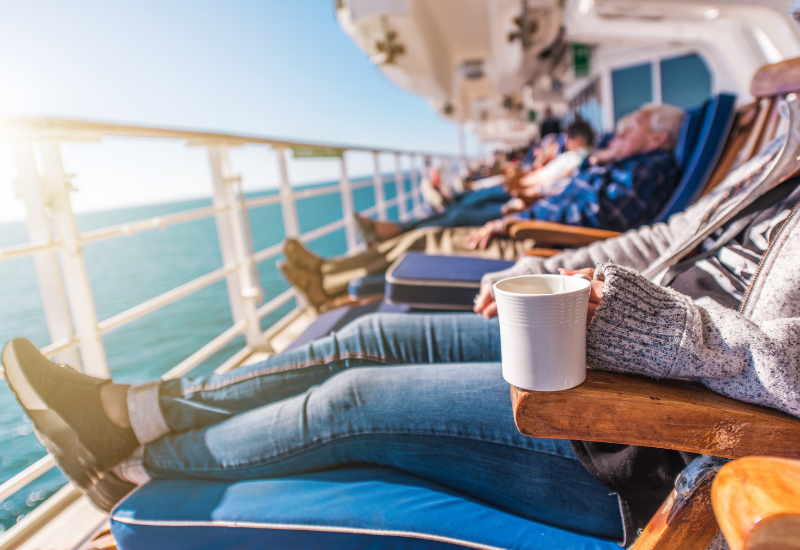Cruise Travel: The Complete Guide

While cruise travel is a relatively safe mode of travel, cruise travelers are among the largest purchasers of travel insurance primarily because cruise trips are relatively expensive trips that are often planned far in advance, but traffic accidents happen, jobs end, and people get sick. Cruise travel insurance protects travelers from the losses and risks related to cruise travel.
Click here to see out updated list of the best cruise travel insurance plans.

What are the risks on a cruise?
Some of the unexpected things that can go wrong on a cruise include the following:
- You miss the boat – there are any number of reasons you could miss your cruise departure. You could have a traffic accident en route. Bad weather could delay your flight arrival. You, or someone close to you, could be injured or become ill before you leave. You could be delayed at one of the ports of call and miss the departure. If you miss your cruise departure or have to cancel your trip, who can you call for help?
- Your luggage is delayed or gone entirely – while it’s less common, luggage is still sometimes routed incorrectly, which could mean a significant delay in being reunited with your belongings (especially if you’ve already departed!). Of course, your luggage could also be stolen from you or damaged beyond repair or use. If your luggage is delayed beyond your cruise departure, who will help you track it and what will you do until it arrives? If your luggage is gone entirely, how will you replace the items you need on your trip?
- You have a medical emergency at sea – medical emergencies at sea are common – more common than most travelers think. If you or your child are hurt or become ill on your cruise, the cruise may or may not have medical staff with the necessary training and equipment to help. You may be forced to evacuate the cruise to the nearest medical facility. Who will coordinate medical transportation and how will you pay for it?
- You are assaulted – If you are assaulted prior to or during your cruise trip, you may decide to cancel the trip or end it and return home. How will you recover your travel costs so you can start your own path to recovery?
- Your cruise or tour is canceled – travel suppliers – including cruises, tours, rentals, and on-shore adventure providers – can have financial problems you don’t know about ahead of time. If they cease operations, how will you recover the money you paid them?
- Your wallet or passport is stolen – relaxed travelers can be robbed on board or while exploring the next port of call. The cruise line and its staff are not responsible for lost or stolen items, and once on land, travelers are at the mercy of the local authorities. Who can you contact for help replacing your passport and guarding your identity?
- You need help or advice – anytime you are traveling in a new place, you could be in a situation where you need travel advice or emergency assistance. You may even need help communicating in a foreign language. If you need travel advice, legal advice, or foreign language assistance, who can you call?

What coverage do you need?
While the following is not an exhaustive list of all the coverages available with cruise plans, it describes those that are most useful to cruise travelers.
- ‘Cancel for any reason’ coverage provides reimbursement for your pre-paid travel expenses if you have to cancel your trip prior to departure – no matter what. (Review the details of ‘cancel for any reason’ coverage.)
- Missed connection coverage helps travelers who encounter severe weather, unplanned labor strikes, and even overbooking errors get their trips back on track. (Review the details of missed connection coverage.)
- Medical coverage provides for emergency medical and dental care in the case of a sudden illness or injury on your cruise.
- Evacuation coverage arranges and pays for medically necessary evacuations or for the repatriation of a traveler’s remains. This coverage can also help a patient get home after they have been treated. (Review the details for evacuation and repatriation coverage.)
- Financial default coverage provides reimbursement for payments made to a travel supplier that completely ceases operations due to financial default or bankruptcy. (Review the details of financial default coverage.)
- Trip interruption coverage provides reimbursement for your pre-paid travel expenses if you have to end or interrupt your trip and return home. (Review the details of trip interruption coverage.)
- Worldwide travel assistance services helps travelers who are lost, or need travel assistance, or need help restoring their identification. (Review the details of travel assistance services.)
Who should buy cruise insurance?
Travelers like these should purchase travel insurance:
- Travelers on an expensive cruise. You may have waited and saved a long time for this trip, so it’s important to protect your financial investment. If the trip costs more than you can afford to lose, you should purchase adequate travel insurance coverage.
- Honeymooning couples. Newlyweds don’t need the distraction or complications of trying to solve expensive travel problems on this important trip. Missing a flight connection can cause you to miss the boat and have to fork over additional dollars you didn’t plan on spending just to catch up to the boat.
- Families traveling with children. Just as you plan for emergencies and accidents at home, you have to be just as prepared on your trip. Your child could get sick before the trip and cause a cancellation, they could be hurt or injured in the unfamiliar environment on board, any number of accidents can happen.
- Seniors taking a cruise. Medical emergencies can happen anywhere and the truth is that health insurance plans – even Medicaid – does not provide coverage outside the U.S. borders. Don’t take the risk; get adequate coverage for the trip.

When should you buy your plan?
When you purchase your travel insurance may be just as important as why you purchase it.
- When should I buy my travel insurance?
- What is the buying process?
- How much does travel insurance cost?
- What information do I need to buy it?
Remember that all travel insurance companies offer a free look period with a refund if you decide the plan is not what you need.
Where should you buy?
We recommend purchasing your travel insurance directly from a third-party company for a number of reasons.
- Why buying Travel Insurance from a 3rd party company is better than buying from a Cruise Line
- Buying Travel Insurance from a 3rd party company vs. through a travel agent
- Buying Travel Insurance Directly from the Company vs. Using a Comparison Site
Very briefly, you’ll have more choices and options in your travel insurance plan if you purchase from a third-party company using a comparison tool.
How can you be sure your coverage is adequate?
These tips will help you determine whether you have enough coverage.
- 4 Steps to 100% confidence in your travel insurance plan
- Entering $0 Trip Cost is too risky
- Is ‘Cancel for any reason’ worth it?
What is the best travel insurance for a cruise?
Our analysis found the most important coverages for this type of trip:
- High emergency medical coverage of at least $100,000
- Emergency medical coverage is Primary
- High evacuation coverage of at least $500,000
- Missed connection coverage in case you miss the departure
- Weather cancellations has low time trigger of 6 hours
- Hurricane warnings conditionally covered
- ‘Cancel for any reason’ available – because you just never know

Worldwide Trip Protector
- Covid covered for sickness cancellation and emergency medical
- $100,000 Emergency Medical (Primary)
- $1,000,000 Medical Evacuation
- Weather coverage includes NOAA hurricane warnings
- Great for: Cruises or any other trip that could be affected by hurricanes and weather.
Damian Tysdal is the founder of CoverTrip, and is a licensed agent for travel insurance (MA 1883287). He believes travel insurance should be easier to understand, and started the first travel insurance blog in 2006.
